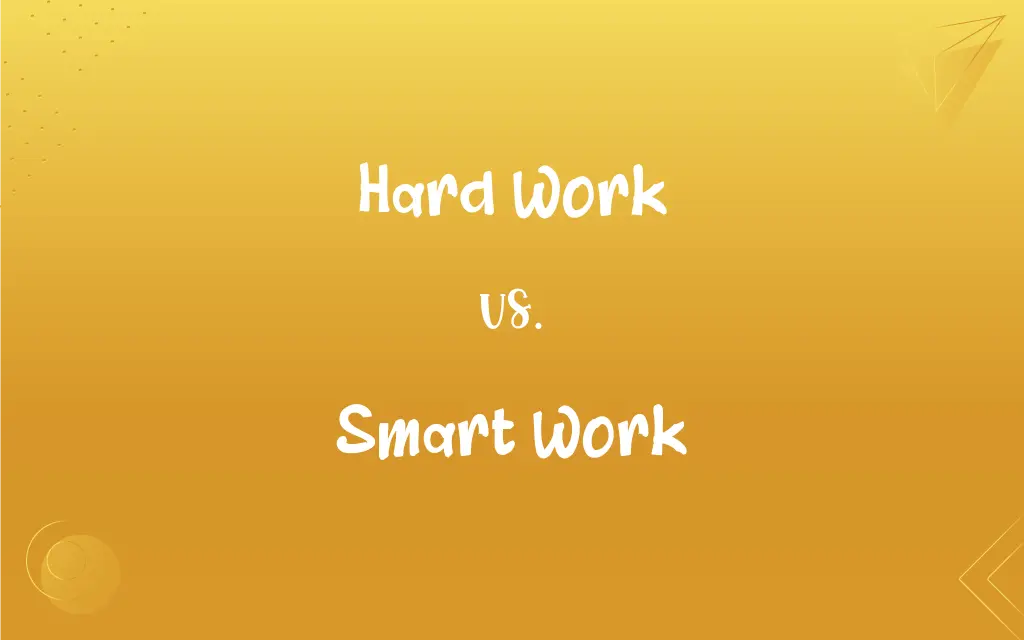Hard Work vs. Smart Work: What's the Difference?
Edited by Janet White || By Harlon Moss || Updated on October 7, 2023
Hard work emphasizes effort and time, whereas smart work focuses on achieving more with strategic effort and less time.

Key Differences
Hard work symbolizes dedicated labor and persistent effort, irrespective of the time and energy utilized. Smart work represents utilizing strategies and efficiencies to accomplish tasks with reduced effort and time. Hard work may involve physical or mental effort over prolonged periods without a focus on simplifying tasks. Smart work, contrastingly, leans towards accomplishing tasks in a more strategic and straightforward manner.
Hard work often demands a steadfast approach to challenges, involving unwavering focus and commitment. In contrast, smart work implies utilizing innovative and intelligent strategies to find easier solutions to those same challenges. Hard work may not always consider efficiency and can sometimes result in unnecessary expenditure of effort. Whereas, smart work always prioritizes achieving maximum productivity with minimal exertion.
The value of hard work lies in developing resilience and often mastering the details of a given task. On the flip side, the essence of smart work is rooted in problem-solving and optimizing processes, aiming to find the shortest path to success without neglecting quality. Hard work ensures that the job is done, sometimes without concern for how long it takes. Meanwhile, smart work targets achieving goals in the most efficient and timely manner possible.
Hard work may instill a sense of gratification and moral virtue due to the consistent and laborious effort applied. Conversely, smart work may offer a sense of achievement derived from the effectiveness of methods and strategies used. Though hard work can build character and work ethic, it may lack efficiency. Smart work, however, while efficient, may lack depth in understanding, often gained through the meticulous approach found in hard work.
Comparison Chart
Definition
Prolonged effort without time concern
Efficient and strategic effort
ADVERTISEMENT
Key Focus
Persistence
Innovation and strategy
Time Consumption
Typically more
Typically less
Effort
High, sometimes exhaustive
Minimized, optimized
Outcome Satisfaction
Derived from effort
Derived from efficiency
Hard Work and Smart Work Definitions
Hard Work
Continuous toil and exertion towards a task.
The artist’s hard work was visible in the intricacy of the sculpture.
ADVERTISEMENT
Smart Work
Achieving more with less through efficient planning and execution.
Her smart work in organizing tasks enabled the completion of the project ahead of schedule.
Hard Work
Putting forth enduring physical or mental effort.
Her hard work in research contributed to groundbreaking discoveries.
Smart Work
Reducing effort and time consumption by adopting effective methods.
The engineer’s smart work in designing saved costs and reduced labor.
Hard Work
Unceasing perseverance to achieve goals.
His hard work eventually enabled him to build a successful company.
Smart Work
Achieving goals with minimum effort through strategic planning.
Through smart work, she streamlined the process, enhancing productivity.
Hard Work
Diligent and sustained effort to complete tasks.
The athlete's hard work led to triumph in the championship.
Smart Work
Utilizing innovative methods to simplify and quicken task completion.
His smart work in utilizing technology expedited the data analysis.
Hard Work
Persistent labor without relying heavily on shortcuts.
Their hard work in the field resulted in a bountiful harvest.
Smart Work
Employing intelligent strategies to optimize outcomes.
Smart work allowed the team to solve the complex problem effortlessly.
FAQs
Is one superior: hard work or smart work?
Neither is categorically superior; the effectiveness of hard work or smart work may depend on the specific context or task at hand.
What is the fundamental principle of hard work?
Hard work essentially involves putting in a persistent and consistent effort towards achieving a goal, often without concern for the amount of time or energy spent.
How is hard work usually recognized or rewarded?
Hard work might be acknowledged through accolades for dedication, quality, and thoroughness in task completion.
Can hard work and smart work coexist in a work ethic?
Absolutely, combining hard work's persistence with smart work’s efficiency can lead to optimized, high-quality outcomes.
Can smart work lead to innovative developments?
Yes, smart work often involves innovative strategies and methods which can spark new developments and efficiencies in various fields.
Can the principles of smart work be learned or trained?
Absolutely, through learning strategic thinking, efficient planning, and utilizing innovative tools, one can enhance their capability for smart work.
What might be a downside to consistently working hard?
Constant hard work can potentially lead to burnout due to possible overexertion and insufficient breaks or leisure.
How can smart work be implemented in a team setting?
In a team, smart work can be implemented by optimizing processes, utilizing technology, and ensuring tasks are allocated in a way that leverages each member’s strengths and expertise.
Does hard work always guarantee success?
While hard work increases the likelihood of success by enhancing thoroughness and quality, it does not guarantee it due to possible external factors.
Can a preference for hard work or smart work be culturally influenced?
Yes, cultural attitudes towards work, efficiency, and success can influence a preference towards either hard work or smart work.
How does hard work relate to mastery in a skill or field?
Hard work, through persistent and sustained effort, can lead to mastery by facilitating in-depth understanding and skill refinement.
How does smart work differ in its approach?
Smart work focuses on achieving goals using strategic and intelligent approaches to minimize effort and time while maximizing output.
How does smart work apply in a learning environment?
In learning, smart work might involve utilizing effective study strategies, leveraging technology, and focusing on applying knowledge in practical scenarios.
Is smart work synonymous with taking shortcuts?
Not necessarily. Smart work involves strategic planning and efficient methods, which might include shortcuts but doesn’t equate to sacrificing quality.
Can hard work compensate for lack of talent or skills?
To an extent, hard work can often compensate for lack of natural talent by developing skills and expertise through practice and dedication.
What might be a potential risk in always choosing smart work?
Relying solely on smart work might sometimes risk superficial understanding or solutions due to its focus on efficiency and shortcuts.
Does smart work align with agile methodologies?
Yes, smart work often aligns with agile methodologies as both prioritize adaptability, continuous improvement, and efficient task completion.
How can educators instill the value of hard work in students?
Educators can instill hard work by encouraging perseverance, setting achievable challenges, and recognizing and rewarding dedicated effort.
How does smart work contribute to work-life balance?
Smart work often involves strategies that save time and effort, potentially offering a better work-life balance by avoiding unnecessary labor.
How can one develop a habit of hard work?
Developing a habit of hard work can involve setting goals, maintaining consistency, and fostering discipline and resilience.
About Author
Written by
Harlon MossHarlon is a seasoned quality moderator and accomplished content writer for Difference Wiki. An alumnus of the prestigious University of California, he earned his degree in Computer Science. Leveraging his academic background, Harlon brings a meticulous and informed perspective to his work, ensuring content accuracy and excellence.
Edited by
Janet WhiteJanet White has been an esteemed writer and blogger for Difference Wiki. Holding a Master's degree in Science and Medical Journalism from the prestigious Boston University, she has consistently demonstrated her expertise and passion for her field. When she's not immersed in her work, Janet relishes her time exercising, delving into a good book, and cherishing moments with friends and family.
































































